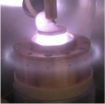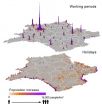(Press-News.org) Asthma, which inflames and narrows the airways, has become more common in recent years. While there is no known cure, asthma can be managed with medication and by avoiding allergens and other triggers. A new study by a Tel Aviv University researcher points to a convenient, free way to manage acute asthmatic episodes — catching some rays outside.
According to a paper recently published in the journal Allergy, measuring and, if need be, boosting Vitamin D levels could help manage asthma attacks. The research, conducted by Dr. Ronit Confino-Cohen of TAU's Sackler Faculty of Medicine, Meir Medical Center, and the Clalit Research Institute, and Dr. Becca Feldman of the Clalit Research Institute drew on the records of millions of patients and used physician diagnoses, rather than self-reports, for evidence of asthma episodes.
"Vitamin D has significant immunomodulatory effects and, as such, was believed to have an effect on asthma — an immunologically mediated disease," said Dr. Confino-Cohen. "But most of the existing data regarding Vitamin D and asthma came from the pediatric population and was inconsistent. Our present study is unique because the study population of young adults is very large and 'uncontaminated' by other diseases."
A Broad Study
Dr. Confino-Cohen and her team of researchers analyzed the medical records of nearly four million members of Clalit Health Services, Israel's largest health care provider. The Vitamin D levels of 307,900 people were measured between 2008 and 2012. Researchers also took into account key predictors of asthma, such as obesity, smoking, and other chronic diseases. Of some 21,000 asthma patients in Israel studied, those with a Vitamin D deficiency were 25 percent more likely than other asthmatics to have had at least one flare-up in the recent past.
The researchers found that Vitamin D-deficient asthmatics were at a higher risk of an asthma attack. "Uncontrolled asthma" was defined as being prescribed at least five rescue inhalers, one prescription of oral corticosteroids, or visiting the doctor for asthma at least four times in a single year.
"Our results add more evidence to the link between Vitamin D and asthma, suggesting beneficial effects of Vitamin D on asthma exacerbations," said Dr. Confino-Cohen. "We expect that further prospective studies will support our results. In the meantime, our results support a recommendation for screening of Vitamin D levels in the subgroup of asthma patients who experience recurrent exacerbations. In those with Vitamin D deficiency, supplementation may be necessary."
Sunny Side Up?
While most of the Vitamin D in people's bodies comes from exposure to the sun, dermatologists recommend obtaining the ingredient from other sources — fish, eggs, cod liver oil, fortified milk, or a dietary supplement — due to the dangers of overexposure to the sun.
"We know a lot about this disease and many therapeutic options are available. So it's quite frustrating that the prevalence of asthma is not decreasing and many patients suffer exacerbations and significant impairment in their quality of life," Dr. Confino-Cohen, an allergy and clinical immunology specialist, said. "Increasing Vitamin D levels is something we can easily do to improve patients' quality of life."
Based on the findings, the researchers recommend that people whose asthma cannot be controlled with existing treatments have their Vitamin D levels tested. For those with a vitamin D deficiency, supplements may make sense.
"This study provided an exceptional opportunity to research asthma. I received a research grant from Clalit Health Services, which provided us with the opportunity to use their very large database and to conduct the study with the professional staff of Clalit Research Institute," said Dr. Confino-Cohen. "We anticipate further prospective research that will support our findings and open a new treatment modality to the population of uncontrolled asthmatics."
INFORMATION:
American Friends of Tel Aviv University supports Israel's most influential, most comprehensive, and most sought-after center of higher learning, Tel Aviv University (TAU). A leader in the pan-disciplinary approach to education, TAU is internationally recognized for the scope and groundbreaking nature of its research and scholarship — attracting world-class faculty and consistently producing cutting-edge work with profound implications for the future.
TAU is Israel's only institution of higher learning ranked among the world's top 200 universities by the authoritative Times Higher Education World University Rankings. It is one of a handful of elite international universities rated as the best producers of successful startups, and TAU alumni rank 9th in the world for the amount of American venture capital they attract.
Recent fusion experiments on the DIII-D tokamak at General Atomics (San Diego) and the Alcator C-Mod tokamak at MIT (Cambridge, Massachusetts), show that beaming microwaves into the center of the plasma can be used to control the density in the center of the plasma, where a fusion reactor would produce most of its power. Several megawatts of microwaves mimic the way fusion reactions would supply heat to plasma electrons to keep the "fusion burn" going.
The new experiments reveal that turbulent density fluctuations in the inner core intensify when most of the heat goes ...
When researchers at General Electric Co. sought help in designing a plasma-based power switch, they turned to the U.S. Department of Energy's (DOE) Princeton Plasma Physics Laboratory (PPPL). The proposed switch, which GE is developing under contract with the DOE's Advanced Research Projects Agency-Energy, could contribute to a more advanced and reliable electric grid and help to lower utility bills.
The switch would consist of a plasma-filled tube that turns current on and off in systems that convert the direct current (DC) coming from long-distance power lines to the ...
One out of every five new cancer patients is diagnosed with a rare cancer, yet the clinical evidence needed to effectively treat these rare cancer patients is scarce. Indeed, conventional cancer clinical trial methodologies require large numbers of patients who are difficult to accrue in the situation of rare cancers. Consequently, building clinical evidence for the treatment of rare cancers is more difficult than it is for frequent cancers.
Dr. Jan Bogaerts, EORTC Methodology Vice Director, points out, "For rare cancers, we need alternative ways to conceive study designs ...
A study by the University of Southampton has found there are far fewer women studying economics than men, with women accounting for just 27 per cent of economics students, despite them making up 57 per cent of the undergraduate population in UK universities.
The findings suggest less than half as many girls (1.2 per cent) as boys (3.8 percent) apply to study economics at university, while only 10 per cent of females enrol at university with an A level in maths, compared to 19 per cent of males.
"This underrepresentation of women economics degrees could have major implications ...
A solution to one of the key challenges in the development of quantum technologies has been proposed by University of Sussex physicists.
In a paper published today (28 October) in Nature Communications, Professor Barry Garraway and colleagues show how to make a new type of flexibly designed microscopic trap for atoms.
Quantum technology devices, such as high-precision sensors and specialised superfast computers, often depend on harnessing the delicate interaction of atoms. But the methods for trapping these tiny particles are hugely problematic because of the atoms' ...
Researchers from North Carolina State University have developed a technique that co-opts an immune system already present in bacteria and archaea to turn off specific genes or sets of genes – creating a powerful tool for future research on genetics and related fields.
"This should not only expedite scientific discovery, but help us better engineer microbial organisms to further biotechnology and medicine," says Dr. Chase Beisel, an assistant professor of chemical and biomolecular engineering at NC State and senior author of a paper on the work. "For example, this ...
A study by an international team, including the University of Southampton, has shown population maps based on anonymous mobile phone call record data can be as accurate as those based on censuses.
Their findings show maps made using mobile records are detailed, reliable and flexible enough to help inform infrastructure and emergency planners; particularly in low income countries, where recent population density information is often scarce.
Southampton geographer and senior author on the study, Dr Andy Tatem, says: "Proving the resilience and accuracy of using mobile ...
In a new study, researchers from Uppsala University demonstrate that elderly men with self-reported sleep disturbances run a higher risk of developing Alzheimer's disease than men without self-reported sleep disturbances. The results are published in the scientific journal Alzheimer's & Dementia.
The researchers followed more than 1,000 men, who were initially 50 year old, between the years 1970 and 2010. The results of the study show that self-reported sleep disturbances were linked to an increased risk for Alzheimer's disease during the 40-year follow-up period, particularly ...
This news release is available in German.
How do our close relatives, the chimpanzees, acquire sufficient food when times are lean? By studying wild chimpanzees in the Taï National Park in Côte d'Ivoire researchers of the Max Planck Institute for Evolutionary Anthropology in Leipzig, Germany, provide a clear example of how great apes can acquire extra energy needed to maintain large, costly brains. They show that chimpanzees make their sleeping nests more en route to breakfast sites containing fruits that are more competed for by other daytime fruit-eaters ...
In 2003, a novel coronavirus caused a pandemic that affected 26 countries. Severe Acute Respiratory Syndrome (SARS) was most prevalent in Asia; the number of cases in Singapore was second only to China.
In an article published in the American Journal of Roentgenology (AJR), a group of radiologists in Singapore outline the ways in which both medical facilities and practitioners there have incorporated lessons learned from the SARS pandemic.
"The pandemic served as a wake-up call for the medical services, which had to respond and reorganize quickly to meet the rapidly ...



